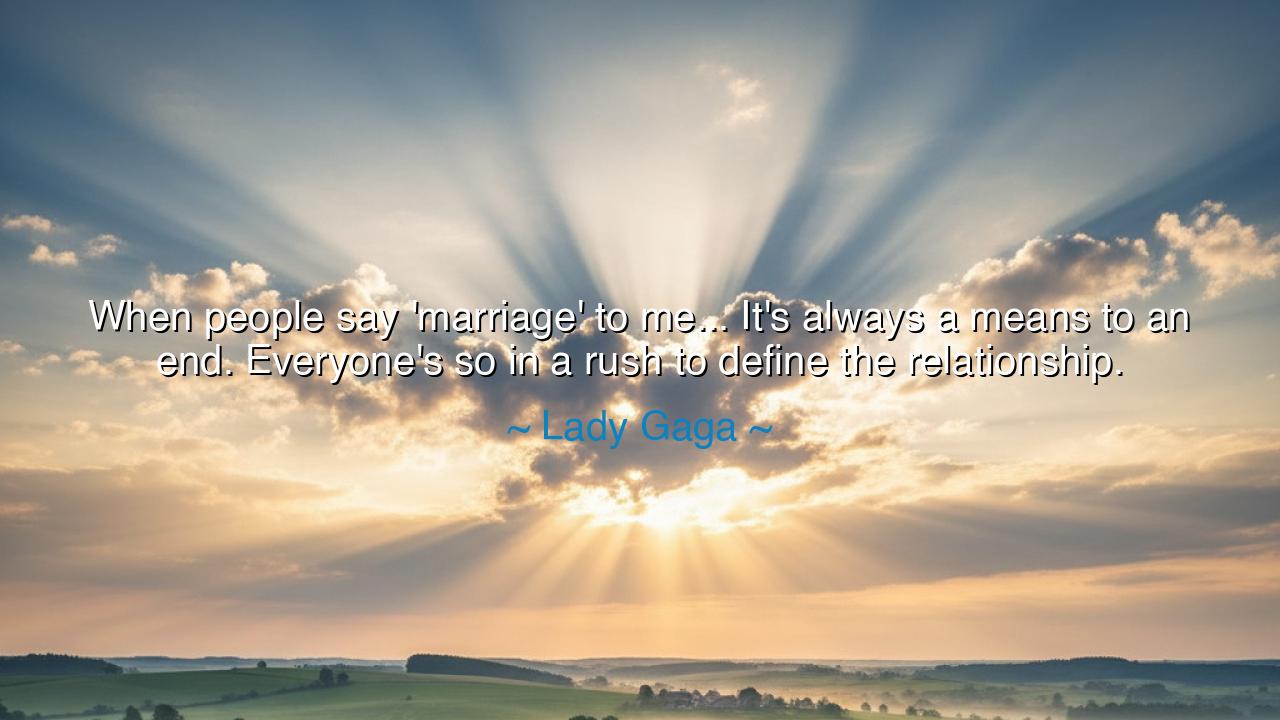
When people say 'marriage' to me... It's always a means to an
When people say 'marriage' to me... It's always a means to an end. Everyone's so in a rush to define the relationship.






The words of Lady Gaga, “When people say ‘marriage’ to me... It’s always a means to an end. Everyone’s so in a rush to define the relationship,” speak as a challenge to the modern spirit’s obsession with labels, appearances, and finality. In her reflection, there is not rebellion against marriage, but a lament for the loss of depth, for the haste with which people seek to name love rather than to nurture it. She speaks as one who has walked through the noise of fame and desire and seen how easily the sacred becomes transactional — how love, instead of being a journey of discovery, becomes a destination of convenience.
The ancients would have understood her grief. They too warned that to define too quickly is to destroy the mystery of becoming. The philosopher Plato wrote that love begins as a divine madness, a yearning for beauty that transcends the visible. But when mortals try to capture that flame in rules and titles, they reduce it to ash. So when Gaga says that “everyone’s in a rush to define the relationship,” she reminds us that true union is not born of definition but of evolution — that love is not a contract sealed by words, but a bond revealed through time, trust, and shared becoming.
In every age, there have been lovers who defied the urge to conform. Consider Abelard and Héloïse, the scholar and the nun, whose love in the twelfth century scandalized the world. They married in secret, yet their truest connection was not in the ceremony but in their letters — in the meeting of minds, in the honesty of spirit, in their refusal to let society’s definitions contain what was vast and sacred. Though the world called their union forbidden, their love endures in history as a testament to the truth Gaga speaks: that love defined too soon, or too narrowly, is love diminished.
Marriage, in its truest essence, was never meant to be an end. In the ancient understanding, it was a path, a shared pilgrimage toward virtue and understanding. But modern minds, impatient and fearful, often see it as a finish line — proof of success, a public declaration that validates private emotion. Gaga’s words cut through that illusion. She reminds us that love is not a trophy, nor a destination, but a living thing — one that must breathe, wander, and grow before it can ever be named. The rush to define it is the rush to confine it.
There is a danger in this haste. When people seek the label before the substance, they build temples on sand. A relationship must first endure silence, hardship, and uncertainty — it must learn the rhythm of two souls moving together. To force definition too early is to silence that rhythm, to choke the song before it finds its melody. Gaga’s insight, though modern in voice, carries the wisdom of the ancients: that love must be experienced in fullness before it can be spoken of truthfully.
In the story of Antony and Cleopatra, one sees both the beauty and peril of trying to define the undefinable. Their love was fierce, world-defying, and intoxicating — yet it could not survive the structures of empire and expectation. Rome demanded order; they offered passion. In the end, their downfall was not love itself, but the world’s need to categorize and contain what was too vast for reason. So it is in every age: society craves definition, while love seeks freedom.
Let this be the lesson to those who walk the path of affection and longing: do not rush to define, but to understand. Let your love be an unfolding, not an agreement. Seek not the title of “married” or “committed” before you have learned the quiet art of devotion. Love that endures is not born from the world’s validation, but from the slow building of trust, the courage to reveal one’s soul, and the willingness to let time weave its truth.
Thus, Lady Gaga’s words stand as a song of liberation — not against marriage, but against haste. Love is not a contract but a creation; not a means to an end, but the end that renews itself each day. When you find someone worthy, do not rush to define what you share. Live it. Tend it. Let it mature into something unbreakable. For the greatest loves, like the greatest works of art, are not named at their beginning — they are understood only in their becoming.






AAdministratorAdministrator
Welcome, honored guests. Please leave a comment, we will respond soon